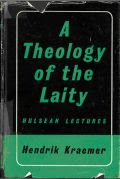…the laity, generally speaking, feels itself spiritually powerless and illiterate as to its witness in that sector, which is the very place where most of its life is spent. This is the appalling problem, hidden by the fact that this laity, impotent and paralysed in the most strategic region of their life, are often faithful worshippers and do all kinds of service in the ordinary run of church life. The problem is still more appalling because the relevancy of the Church, and what she represents in the modern world, is dependent on the conversion of this impotence and paralysis into a manifestation of power and spirit. (37-8)
 Sounds like an extract from an LICC publication? These words were written in 1958 by Hendrik Kraemer in his Theology of the Laity. I stumbled across this book while we were in the process of clearing the LICC library and began to flick through it. It only took a few glances to realise that Kraemer's words (sadly) remain as potent and relevant today as when they were first published. (For those interested, the book is still in print and available from Amazon)
Sounds like an extract from an LICC publication? These words were written in 1958 by Hendrik Kraemer in his Theology of the Laity. I stumbled across this book while we were in the process of clearing the LICC library and began to flick through it. It only took a few glances to realise that Kraemer's words (sadly) remain as potent and relevant today as when they were first published. (For those interested, the book is still in print and available from Amazon)
Kraemer was a lay theologian, linguist and missiologist, first director of Chateau de Bossy in Switzerland and a significant contributor to the revitalization of the Netherlands Reformed Church in the postwar situation. In this, one of his last books, Kraemer seeks to describe a theology of and not only for the laity, to adequately describe the place of the laity in the church. He saw this as a central task, arguing that it is not simply an "interesting intermezzo" but essentially reworks our idea of what it means to be church together with major implications for both leaders and laity. As we would term it, he is calling for a fundamental culture shift in the church toward the equipping of the laity:
Everything in the Church and in the world revolves around the so-called “ordinary member of the Church”. For in him must become somehow visible that the Lordship of Christ over the Church and over the world is not a fairy-tale or a gratuitous assertion, but a reality which “bites”. The apparatus of the Church has to be directed to that end…The total activity of the Church in its worship, its preaching, its teaching, its pastoral care should have the purpose of helping the “ordinary membership of the Church” to become what they are in Christ. (99-100)
Kraemer captures a number of our key concerns, arguing that the laity occupy a hugely significant position as those who bridge the world and the church and need to be equipped for this task and that this is indeed a high calling. He writes:
…the laity should...not be seen primarily as the needy, ignorant and helpless, but as that part of the Church that has to carry the brunt of the burden of encounter with the world in and around themselves, and to voice and incarnate the Church’s or better, Christ’s relevance to the whole range of human life. (114)
So, the laity need to be encouraged and resourced to live well in those contexts, for they exist as the "daily repeated projection of the Church in the world" (170). He continues...
If the specific place of the laity in the world is at the frontiers, where the real dialogue between Church and World becomes an event, the laity at large needs a new orientation, a new grasp of the whole realm and scale of the reality of Christ, and a new equipment. (172)
This will be a book that we wish to return to and there will be further posts exploring some of Kraemer's themes. However, in the meantime, here is a question that we've been asking ourselves: given that this book was written over 50 years ago, why are these ideas still relevant? Why was Kraemer's concern not listened to by the church at the time? How can this voice be heard again today?

No comments:
Post a Comment